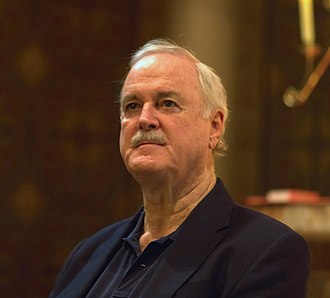John Cleese

John Marwood Cleese (/kliːz/ KLEEZ; born 27 October 1939) is an English actor, comedian, screenwriter, and producer. Emerging from the Cambridge Footlights in the 1960s, he first achieved success at the Edinburgh Festival Fringe and as a scriptwriter and performer on The Frost Report. In the late 1960s, he co-founded Monty Python, the comedy troupe responsible for the sketch show Monty Python’s Flying Circus. Along with his Python co-stars Terry Gilliam, Eric Idle, Terry Jones, Michael Palin and Graham Chapman, Cleese starred in Monty Python films, which include Monty Python and the Holy Grail (1975), Life of Brian (1979) and The Meaning of Life (1983).
In the mid-1970s, Cleese and first wife Connie Booth co-wrote the sitcom Fawlty Towers, and he starred in it as Basil Fawlty. The series resulted in Cleese’s receiving the 1980 BAFTA for Best Entertainment Performance, and in 2000 the show topped the British Film Institute’s list of the 100 Greatest British Television Programmes. In a 2001 Channel 4 poll, Basil was ranked second on its list of the 100 Greatest TV Characters. Cleese co-starred with Kevin Kline, Jamie Lee Curtis, and former Python colleague Michael Palin in A Fish Called Wanda (1989) and Fierce Creatures (1997), both of which he also wrote. For A Fish Called Wanda he was also nominated for the Academy Award for Best Original Screenplay. He has also starred in Time Bandits (1981) and Rat Race (2001) and has appeared in many other films, including Silverado (1985), Mary Shelley’s Frankenstein (1994), two James Bond films (as R and Q), two Harry Potter films (as Nearly Headless Nick) and the last three Shrek films.
Cleese has specialised in satire, black comedy, sketch comedy and surreal humour.[1] With Yes Minister writer Antony Jay, he co-founded Video Arts, a production company making entertaining training films. In 1976, Cleese co-founded The Secret Policeman’s Ball benefit shows to raise funds for the human rights organisation Amnesty International. Although a staunch supporter of the Liberal Democrats, in 1999 he turned down a life peerage offer from the party.
Cleese was born in Weston-super-Mare, Somerset, the only child of Reginald Francis Cleese (1893–1972), an insurance salesman, and his wife Muriel Evelyn (née Cross, 1899–2000), the daughter of an auctioneer.[2] His family’s surname was originally Cheese, but his father had thought it was embarrassing and used the name Cleese when he enlisted in the Army during the First World War; he changed it officially by deed poll in 1923.[3][4] As a child, Cleese supported Bristol City FC and Somerset County Cricket Club.[5][6] Cleese was educated at St Peter’s Preparatory School (paid for by money his mother inherited[7]), where he received a prize for English and did well at cricket and boxing. When he was 13, he was awarded an exhibition at Clifton College, an English public school in Bristol. He was already more than 6 feet (1.83 m) tall by then.[8]
“The biggest influence was The Goon Show. Kids were devoted to it. It was written by Spike Milligan. It also had Peter Sellers in it, who of course is the greatest voice man of all time. In the morning, we’d be at school and we’d discuss the whole thing and rehash the jokes and talk about it. We were obsessed with it.”
—Cleese on his greatest comedic influence growing up, 1950s BBC Radio comedy, The Goon Show.[9]
Cleese allegedly defaced the school grounds, as a prank, by painting footprints to suggest that the statue of Field Marshal Earl Haig had got down from his plinth and gone to the toilet.[10] Cleese played cricket in the First XI and did well academically, passing eight O-Levels and three A-Levels in mathematics, physics and chemistry.[11][12] In his autobiography So, Anyway, he says that discovering, aged 17, he had not been made a house prefect by his housemaster affected his outlook: “It was not fair and therefore it was unworthy of my respect… I believe that this moment changed my perspective on the world.”[13]
Cleese could not go straight to Cambridge, as the ending of National Service meant there were twice the usual number of applicants for places, so he returned to his prep school for two years[14] to teach science, English, geography, history, and Latin[15] (he drew on his Latin teaching experience later for a scene in Life of Brian, in which he corrects Brian’s badly written Latin graffiti).[16] He then took up a place he had won at Downing College, Cambridge, to read law. He also joined the Cambridge Footlights. He recalled that he went to the Cambridge Guildhall, where each university society had a stall, and went up to the Footlights stall, where he was asked if he could sing or dance. He replied “no” as he was not allowed to sing at his school because he was so bad, and if there was anything worse than his singing, it was his dancing. He was then asked “Well, what do you do?” to which he replied, “I make people laugh.”[14]
